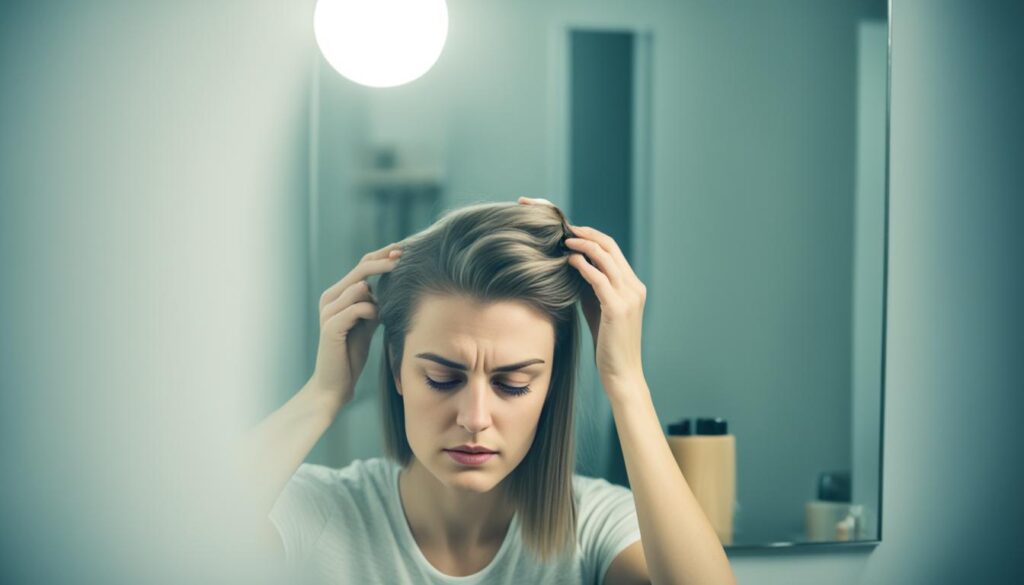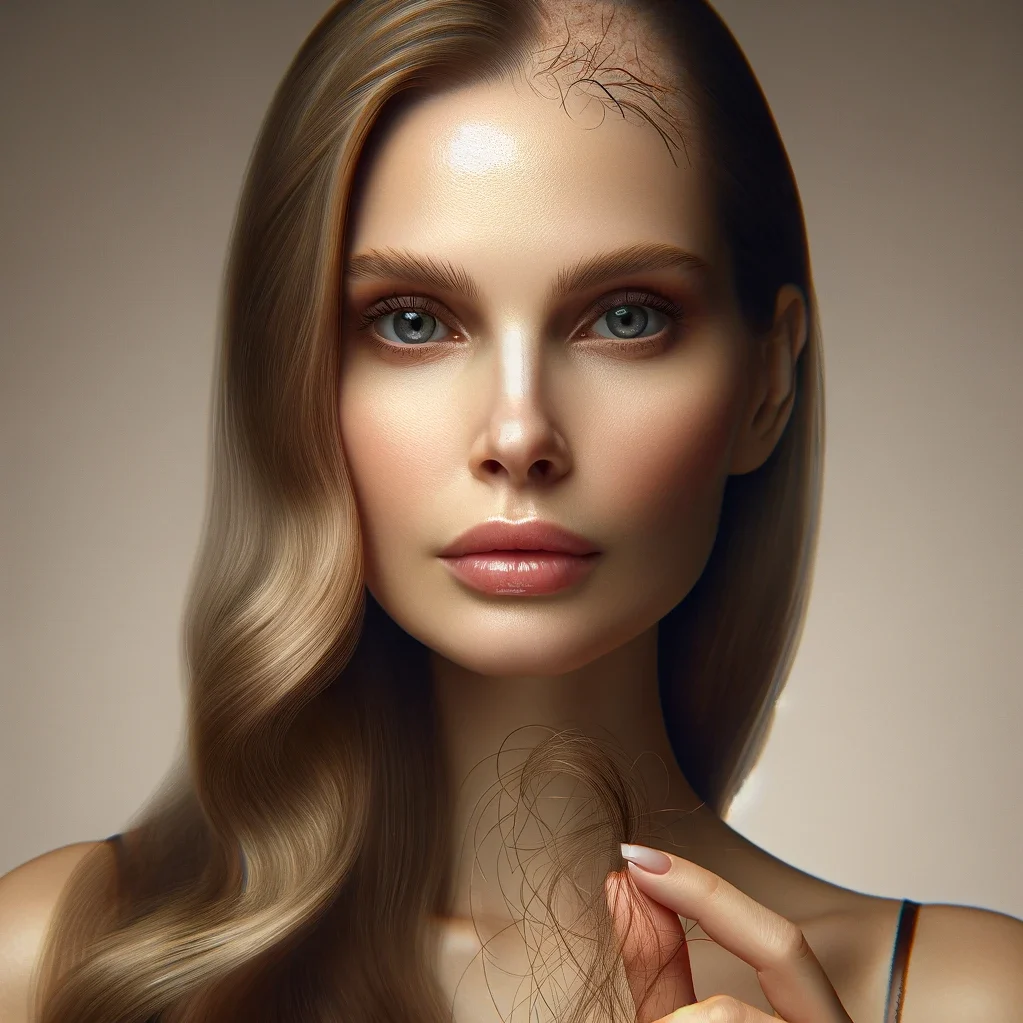The emotional impact of hair loss in young women is a significant concern that affects their self-esteem, psychological well-being, and overall quality of life. Hair loss can have profound effects on a woman’s self-image and body confidence, leading to feelings of self-consciousness, embarrassment, and frustration.
Body image plays a crucial role in how individuals perceive themselves, and hair loss can disrupt this perception, resulting in negative emotional effects. Women experiencing hair loss may feel less attractive, which can lead to a decline in self-esteem and self-worth. The impact of hair loss on self-esteem can interfere with daily routines and limit social activities, causing further distress and isolation.
The psychological distress caused by hair loss can also extend to personal and professional relationships. Studies have shown that women with alopecia are more likely to experience marital problems and difficulties in their careers.
Recognizing the emotional impact of hair loss in young women is essential for healthcare professionals. Providing appropriate emotional support, counseling, and guidance can help these women cope with the challenges they face, promoting emotional well-being and empowering them to navigate their lives confidently.
Understanding the Psychological Effects of Hair Loss
The experience of hair loss can have a profound impact on individuals, both emotionally and psychologically. Hair loss can lead to a range of negative psychological effects, including decreased self-esteem, increased self-consciousness, and feelings of unattractiveness. Individuals may perceive themselves as older and less sexually attractive, which can significantly impact their confidence and relationships.
One of the key psychological challenges individuals face with hair loss is the fear of social rejection. The stigma surrounding hair loss can cause anxiety and social withdrawal, as individuals worry about being judged or excluded. This fear of social acceptance can further contribute to the emotional distress experienced by those dealing with hair loss.
Research has shown a strong link between hair loss and psychiatric disorders such as depression, anxiety disorders, and social phobia. The psychological distress caused by hair loss can further exacerbate these conditions, leading to a cycle of negative emotions and behaviors.
To provide a deeper understanding, the following table highlights some of the common psychological effects of hair loss:
| Psychological Effects of Hair Loss |
|---|
| Decreased self-esteem |
| Increased self-consciousness |
| Feelings of unattractiveness |
| Anxiety and fear of social rejection |
| Social withdrawal |
| Depression |
It is crucial for healthcare professionals to recognize and address the psychological consequences of hair loss. By providing appropriate support, counseling, and treatment options, individuals can better manage the emotional distress and improve their overall well-being.

Coping with Hair Loss and Promoting Emotional Well-being
Coping with hair loss can be a challenging journey, but there are various strategies and resources available to help you navigate the emotional impact and promote your overall well-being. Taking care of your emotional health is just as important as addressing the physical aspects of hair loss. By incorporating self-care practices, seeking support from others, and exploring therapeutic options, you can empower yourself to cope with hair loss and embrace a positive mindset. Here are some key elements to consider in your journey:
Self-Care: Nurturing Your Mind, Body, and Soul
Practicing self-care is crucial when coping with hair loss. Take time to engage in activities that bring you joy, whether it’s going for a walk, indulging in a hobby, or spending quality time with loved ones. Prioritize activities that boost your self-esteem and confidence, allowing you to feel good about yourself. Remember that self-care is not selfish but essential for your overall well-being.
Quote: “Self-care is not selfish. You cannot serve from an empty vessel.” – Eleanor Brownn
Seeking Emotional Support: You Are Not Alone
During this challenging time, seeking emotional support is crucial. Reach out to trusted friends, family members, or support groups who can provide understanding and empathy. Sharing your thoughts and feelings with others who have experienced similar challenges can be immensely comforting. Surround yourself with a supportive network that uplifts you and reminds you that you are not alone in your journey.
Therapy: Developing Coping Mechanisms and Addressing Underlying Issues
Therapeutic interventions such as cognitive-behavioral therapy (CBT) or counseling can be beneficial in helping you develop coping mechanisms and address any underlying psychological issues related to hair loss. These therapies provide a safe space to explore your emotions, gain insights into your thoughts and behaviors, and develop effective strategies to navigate the emotional challenges of hair loss.
Holistic Care: Integrating Medical Treatment and Psychological Support
Embracing a holistic approach to hair loss involves integrating medical interventions with psychological support. Consult with healthcare professionals who specialize in hair loss to explore treatment options tailored to your specific needs. Combining medical treatments with counseling or therapy can provide comprehensive care, addressing both the physical and emotional aspects of hair loss.
| Benefits of Coping Strategies for Hair Loss | Support Groups | Therapy | Holistic Care |
|---|---|---|---|
| Enhanced emotional well-being | Opportunity to connect with others who understand your experience | Development of effective coping mechanisms | Comprehensive care that addresses physical and emotional needs |
| Improved self-esteem and confidence | Emotional support and reassurance | Exploration and resolution of underlying psychological issues | Integration of medical treatments with psychological support |
| Reduced sense of isolation | Exchange of coping strategies and tips | Safe space to express emotions |
Remember, coping with hair loss is a personal journey, and everyone’s experience is unique. Embrace the strategies that resonate with you and seek guidance from professionals in the field. With the right support and self-care practices, you can navigate the emotional challenges of hair loss and foster a sense of acceptance and well-being.
Conclusion
Hair loss in young women can have a profound psychological impact, affecting their emotional well-being, self-esteem, and overall mental health. It is crucial for healthcare professionals to recognize and address the psychological consequences of hair loss in order to provide effective support and treatment.
By offering emotional support, counseling, and promoting coping strategies, individuals dealing with hair loss can better manage the psychological distress associated with this condition. Encouraging a holistic approach that combines medical interventions with psychological support is essential in promoting emotional well-being and improving the quality of life for these young women.
Recognizing the psychological impact of hair loss involves acknowledging the emotions and challenges that arise from the experience. It is important to provide a safe space for individuals to express their feelings and concerns, offering empathy and understanding throughout their journey.
Ultimately, addressing the psychological impact of hair loss is a vital component of comprehensive care. By integrating psychological support into treatment plans, healthcare professionals can help young women facing hair loss to navigate their emotions, enhance their self-esteem, develop effective coping strategies, and maintain overall mental health.
FAQ
How can hair loss in young women impact their emotional well-being?
Hair loss in young women can have a profound emotional impact, leading to decreased self-esteem, increased self-consciousness, and feelings of unattractiveness. It can disrupt daily routines, limit social activities, and even affect personal and professional relationships.
What psychological effects can hair loss have on individuals?
Hair loss can lead to anxiety, depression, social phobia, and other psychiatric disorders. It can also cause individuals to perceive themselves as older and less sexually attractive, impacting their confidence and relationships.
How can individuals cope with hair loss and promote emotional well-being?
Coping with hair loss involves practicing self-care, seeking emotional support from friends, family, or support groups, and considering therapy or counseling to develop coping mechanisms and address any underlying psychological issues.
Why is it important for healthcare professionals to recognize and address the psychological consequences of hair loss?
Healthcare professionals play a crucial role in providing emotional support, counseling, and promoting coping strategies for individuals dealing with hair loss. By addressing these psychological consequences, they can improve the overall well-being and quality of life for those affected.

